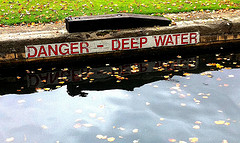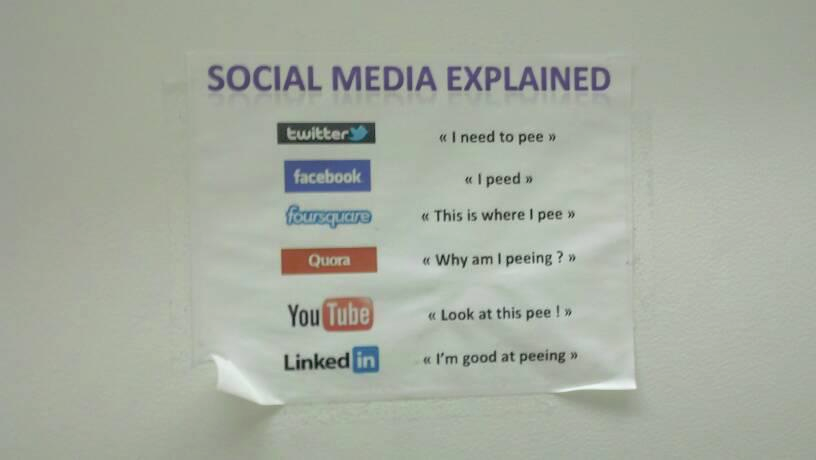This is the trailer for Nora Bateson’s intriguing film about her father, Gregory, which my OU colleagues are screening on February 13 at 19.00 in the Berrill Theatre at the University’s campus in Milton Keynes. I hope to be there.
Category Archives: Asides
A reminder of what’s ahead
Our broken system
For me, the big question raised by the way the banking crisis morphed into a sovereign debt crisis which has eroded some key elements of selected European democracies (Ireland, Greece, Italy) is whether it shows that our system of representative democracy is, in fact, broken. Just to enumerate: the Irish government is slashing its welfare state in order to compensate foreign shareholders in zombie banks for their foolhardy investments in those (private) institutions; representative government in Greece and Italy has effectively been replaced by technocratic administrations which have no democratic mandate but are deemed necessary to ensure that the bond market is placated; and the Cameron government in Britain is choking off the prospect of economic growth and slashing benefits in order to placate the bond market. What all of this implies is that it doesn’t matter whom the people elect to govern them because, in the end, it’s the bond markets that decide what happens.
This brings us (or me, anyway) to “the end of history” thesis of Francis Fukuyama, which is basically the proposition that liberal democracy is the only plausible form of government for a modern society. And it explains why the most interesting thing I’ve read this weekend is a long interview with him by Sophie Roell. The peg for the interview is a regular feature in The Browser in which prominent people are asked to nominate and discuss five books they regard as important. Fukyyama’s five books are:
Fukuyama’s main message is that, to adapt a phrase that was popular with the Obama team before they came to power, we’ve wasted a good crisis. The financial meltdown, Fukuyama thinks, revealed a great deal about the nature of America’s political and economic system. The shame, he says, is that opportunities to change it are now being ignored.
“While nobody wants to have a crisis”, he says,
“it does serve as an opportunity for reform. I would say that one of the big tragedies is that in many respects this was a completely wasted crisis. It wasn’t deep enough. No one wants a crisis on the scale of the Great Depression, but because policymakers acted quickly to put a floor under the collapse of the system, a lot of the political actors were able to shake off the implications of the crisis. That really comes through in the dissenting Republican view of the Financial Crisis Inquiry Commission Report – to pretend, in a way, that nothing actually happened that would undermine a belief in the self-regulating nature of markets.”
Fukuyama’s view seems to be that while the crisis hasn’t invalidated his thesis about liberal democracy being the only plausible system, it has revealed that we don’t have a functioning liberal democracy any more — which is what I’ve concluded from what’s happened.
“One of the really big issues, which is most forcefully raised by Simon Johnson in his book, 13 Bankers, is whether we are actually living in a kind of oligarchy of the sort we attribute to places like Russia or Kazakhstan. The direct role concentrated wealth plays in blocking needed reform then merges, in my mind, into the larger question, which is the impact of interest groups and the way that distorts the political choices that we face – a general crisis for all modern democracies.”
Yep. The way the banks were able (a) to screw us, (b) be rescued by the taxpayer and escape the consequences of their reckless, cynical and ruthless behaviour and (c) indirectly trigger a sovereign debt crisis does indeed suggest that our system is broken. The question is whether it is broken beyond repair. The answer is: not necessarily, but there’s no evidence that our political classes have the appetite or the capacity to fix it.
The only one of Fukuyama’s five choices that I’ve read is Michael Lewis’s The Big Short. It’s easily the best book I read last year, because (a) it vividly demonstrates how cynically the whole CDO racket was organised by the banks to screw everybody except themselves; and (b) it shows that the catastrophe could have been forseen by focussing on a small number of offbeat characters who not only predicted it, but made fortunes by betting that it would happen.
Fukuyama explains this better than I can.
“What I thought was most interesting about this book was that there is, to this day, a view about the whole pathology of collateralised debt obligations (CDOs) – these highly complex, packaged mortgage securities – as well as the credit default swaps – the insurance contracts written on those securities – that Wall Street created them and they simply got out of hand. They didn’t anticipate it would be hard to value them, how they would be misused, and so forth. What Michael Lewis points out very forcefully is that they were deliberately created by Wall Street banks in order to produce non-transparent securities that could not be adequately evaluated by the rating agencies, which then could be sold to less sophisticated investors, who would buy the idea that this junk debt actually had triple A ratings. So what this book does quite brilliantly is show that there was actually a high degree of intentionality in creating the crisis. The worst of all these securities are the so-called synthetic CDOs. A CDO is a bond that represents maybe a couple of thousand mortgages; a synthetic CDO is a group of hundreds of CDOs, all packaged into a single security. When you get to that level of complexity, no one can evaluate what this thing is worth. You can come up with sophisticated rationales for why this might actually follow some kind of market logic, but I think Lewis shows that the reason this happened is that they didn’t want anyone to be able to rate it.”
At this point Sophie Roell interjects to say that “they weren’t intending to cause a big crisis and recession – they were just making money by selling dodgy stuff. They were just being used-car salesmen, in a sense”. To which Fukuyama replies:
“Yes, but it raises this issue of intentional fraud, which has been at the root of a lot of the charges against banks like Goldman. The book is a story about these five or six weird individuals that realise what’s going on – that this housing bubble was expanding and then eventually would burst – and the other thing it makes very clear is that it undermines any kind of notion that the crisis was not foreseeable. In fact, you can see that a lot of the big banks began to understand that it was not going to be sustained, and did a lot to promote it, hoping that they would be able to get out before the whole thing collapsed”.
As to the inadequacy of our political classes, the book by Simon Johnson and James Kwak seems spot on. The astonishing thing is that here we are in 2012, the fourth year after the crisis, and we still don’t have an adequate regulatory system in place to prevent a crisis like this from happening again. Fukuyama doesn’t think that regulation is going to work, and he’s right.
“The investment banks have got way too much talent, are way too creative and way too nimble for regulators ever to keep up. Therefore the real solution all along should have been to break these big banks up into smaller pieces, which is essentially what Glass-Steagall and the interstate banking regulations of the 1930s did. Once the banks are no longer too big to fail, then you can just let the market work the way it’s supposed to. If people take outsized risks and they get into trouble, then they just go bankrupt, and that is essentially what happened to MF Global. It hurts people, but it’s not a systemic crisis.
That option was never seriously considered. We briefly toyed with the idea of nationalising the banks in the depths of the crisis. In the debate leading up to [the] Dodd-Frank [Bill], there was actually one really interesting roll call vote. There was an amendment proposed that would have limited the size of financial institutions. It was defeated something like 60 to 30, and if you look at the list of the people who voted against it, it includes Chuck Schumer and all of these liberal Democrats. They’re the ones who should have been leading the charge against this kind of concentrated power, but given where they get their money, they weren’t willing even to consider it. That’s why we still haven’t solved this problem. In that one specific respect, Johnson is completely correct. It’s not just a matter of corrupt money bribing people; it’s also a case of intellectual capture. People just can’t think outside the parameters that are set by this community and just don’t entertain certain kinds of potential solutions to it.”
And that’s it in a sentence. We’re screwed because of two things: our corrupt and/or dysfunctional legislatures (like those of the US, Ireland, Greece and Italy); and intellectual capture — the inability to imagine any alternative reality. Which, in a strange way, brings us back to Fukuyama’s original “end of history” thesis, the main implication of which was that the collapse of the Soviet Union meant that the only major alternative to liberal democracy had self-destructed. What he didn’t foresee was that the absence of serious ideological competition would blind us to the perversion of the system by corporate elites and powerful vested interests.
Fintra beach: end of the day
We’re in Donegal, where the upper slopes of the mountains look as though they’ve been dusted with icing sugar. We had a lovely walk on Fintra beach towards the end of the day, during which we were drenched by driving sleet. And yet it was beautiful – especially when it stopped and I was able to take the camera out from under my parka.
Complexity theory for regulators
In the last few weeks I’ve been involved in three workshops/symposia which, in different ways, were all about a single topic: evidence-based policy and decision-making. (The subjects were: evidence-based policy in learning technology; the future of research-intensive universities; and understanding social networking.) One thought that has surfaced in all three events is that they were at least partly about making decisions in very complex social systems — which of course leads to an obvious question: can complexity science (or what one might call “social physics”) be of any use in this context?
I did some initial speculation about this in Chapter 5 of my new book, but worried that I’d lose my target audience if I delved too deeply into graph theory etc., and so left it at the speculative level. But the idea persists: can complexity science help in policy formation?
This morning I came on a fascinating article by two German physists, Tiago Peixoto and Stefan Bornholdt, who have modelled pricing behaviour in certain kinds of distributed markets — e.g. that for petrol at the pump. The most intriguing outcome of their work is the idea that cartel-like behaviour can be an emergent property of these markets.
Why is this interesting? Well, to date, our instinctive regulatory responses to situations where a large number of suppliers magically agree on a price is to assume the existence of a cartel. No smoke without fire, and all that. But if Peixoto and Bornholdt are right, then that may not always be true.
The dynamics undergoes [sic] a transition at a specific value of the strategy update rate, above which an emergent cartel organization is observed, where individuals have similar values of below optimal trustworthiness. This cartel organization is not due to an explicit collusion among agents; instead it arises spontaneously from the maximization of the individual payoffs. This dynamics is marked by large fluctuations and a high degree of unpredictability for most of the parameter space, and serves as a plausible qualitative explanation for observed elevated levels and fluctuations of certain commodity prices.
Fascinating stuff. Interesting also that the authors don’t see “dynamics” as a plural noun. Perhaps they regard it as the same as ‘economics’ or ‘mathematics’?
On the Internet…
… Nobody knows you’re a dog.
Lovely, witty photograph by Quentin.
The Digger on Twitter?
Hmmm… There’s a Twitter account that purports to be from the man himself. The tweets are like a caricature of the Digger’s views as represented by Private Eye.
He/It has 140,751 followers at the moment.
I wonder…
Everything you need to know about this year’s CES
From David Pogue.
LAS VEGAS — If you just peek into the huge International Consumer Electronics Show, you might think that it’s mostly a deafening showcase for tablets, thin TV screens, superthin laptops and Android phones.
But if you really take the time to look — if you walk all 15 miles of exhibit halls — you’ll discover that, in fact, you were right. C.E.S. really is primarily a deafening showcase for tablets, thin TV screens, superthin laptops and Android phones.
My top 10 books about the internet
Newspapers love lists — partly because they believe that readers love them too. Maybe they’re right: one of the most commented-upon and recirculated pieces I’ve ever written was about the top ten websites, even though, in a way, the idea of there being a “top ten” of anything on or related to the Net is kind of absurd. Still, when asked, I had a go at nominating ten good books about the Net.





